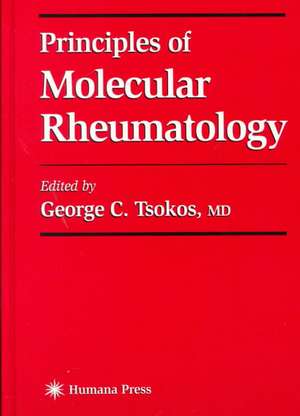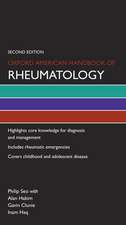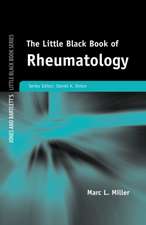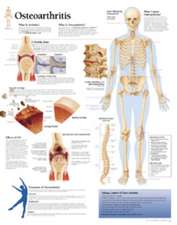Principles of Molecular Rheumatology: Current Molecular Medicine, cartea 1
Editat de George C. Tsokosen Limba Engleză Hardback – 24 iul 2000
| Toate formatele și edițiile | Preț | Express |
|---|---|---|
| Paperback (1) | 1936.16 lei 6-8 săpt. | |
| Humana Press Inc. – 19 noi 2010 | 1936.16 lei 6-8 săpt. | |
| Hardback (1) | 1452.86 lei 6-8 săpt. | |
| Humana Press Inc. – 24 iul 2000 | 1452.86 lei 6-8 săpt. |
Preț: 1452.86 lei
Preț vechi: 1529.33 lei
-5% Nou
Puncte Express: 2179
Preț estimativ în valută:
278.04€ • 301.91$ • 233.55£
278.04€ • 301.91$ • 233.55£
Carte tipărită la comandă
Livrare economică 23 aprilie-07 mai
Preluare comenzi: 021 569.72.76
Specificații
ISBN-13: 9780896037731
ISBN-10: 0896037738
Pagini: 542
Ilustrații: XIII, 542 p. 57 illus.
Dimensiuni: 178 x 254 x 37 mm
Greutate: 1.49 kg
Ediția:2000
Editura: Humana Press Inc.
Colecția Humana
Seria Current Molecular Medicine
Locul publicării:Totowa, NJ, United States
ISBN-10: 0896037738
Pagini: 542
Ilustrații: XIII, 542 p. 57 illus.
Dimensiuni: 178 x 254 x 37 mm
Greutate: 1.49 kg
Ediția:2000
Editura: Humana Press Inc.
Colecția Humana
Seria Current Molecular Medicine
Locul publicării:Totowa, NJ, United States
Public țintă
Professional/practitionerCuprins
I. Molecular Mechanisms in Rheumatic Diseases.- 1 Genetics.- 2 Viruses.- 3 Apoptosis.- 4 Humoral Response.- 5 T-Cell Signaling.- 6 Adhesion and Costimulatory Molecules.- 7 Transcription Factors.- 8 Immune Complexes.- 9 Complement.- 10 Eicosanoids and Other Bioactive Lipids.- 11 Collagens.- II. Cellular Mechanisms in Rheumatic Diseases.- 12 T-Lymphocytes.- 13 B-Lymphocytes.- 14 Monocytes and Macrophages.- 15 Polymorphonuclear Cells.- 16 Synoviocytes.- 17 Chondrocytes.- 18 Osteoblasts and Osteoclasts.- 19 Animal Models.- III. Pathogenesis of Rheumatic Diseases.- 20 Systemic Lupus Erythematosus.- 21 Rheumatoid Arthritis.- 22 Inflammatory Myopathies.- 23 Systemic Sclerosis.- 24 Vasculitis.- 25 Osteoarthritis.- 26 Osteoporosis.- 27 Heritable Disorders of Connective Tissue.- IV. Molecular Aspects of Treatment of Rheumatic Diseases.- 28 Corticosteroids.- 29 Cytotoxic Drugs.- 30 Complement Inhibitors.- 31 Cytokine Response Modifiers.- 32 Restoration of Immune Tolerance.- 33 Metalloproteases and Their Modulation as Treatment in Osteoarthritis.- 34 Gene Therapy.
Recenzii
"Unlike previous classical textbooks of rheumatology in which the clinical and therapeutic approaches to rheumatic disease are discussed, this one is unique in the contributors' ability to integrate the clinical approach to rheumatic disease with the latest biochemical, cellular, and molecular mechanisms at play in these disorders. This approach allows clinical rheumatologists to gain a better understanding of the cellular and molecular biology that underlies the diseases we treat and the therapeutics we use to treat these disorders.."-Doody's Health Science Book Review Journal
"It contains many figures of good quality." - Journal of Endocrine Genetics
"Unlike previous classical textbooks of rheumatology in which the clinical and therapeutic approaches to rheumatic disease are discussed, this one is unique in the contributors' ability to integrate the clinical approach to rheumatic disease with the latest biochemical, cellular, and molecular mechanisms at play in these disorders. This approach allows clinical rheumatologists to gain a better understanding of the cellular and molecular biology that underlies the diseases we treat and the therapeutics we use to treat these disorders." - Doody Publishing
"It contains many figures of good quality." - Journal of Endocrine Genetics
"Unlike previous classical textbooks of rheumatology in which the clinical and therapeutic approaches to rheumatic disease are discussed, this one is unique in the contributors' ability to integrate the clinical approach to rheumatic disease with the latest biochemical, cellular, and molecular mechanisms at play in these disorders. This approach allows clinical rheumatologists to gain a better understanding of the cellular and molecular biology that underlies the diseases we treat and the therapeutics we use to treat these disorders." - Doody Publishing
Textul de pe ultima copertă
Rheumatic diseases are complex in nature and require for their optimal diagnosis and treatment a critical understanding of the mechanisms that lead to their tissue pathology and various clinical manifestations. In Principles of Molecular Rheumatology, George Tsokos and a panel of authoritative clinicians and researchers synthesize all the latest findings from across cell and molecular biology with the basic principles of rheumatology to create the first textbook of molecular rheumatology. These established experts describe the biochemical mechanisms by which apoptosis, cell signaling, complement, lipids, and viruses contribute to disease expression, and detail both immune and nonimmune cell function in rheumatic diseases. Their review of the major rheumatic diseases integrates the cellular, biochemical, and molecular biological mechanisms that are important in rheumatic disease pathogenesis. The authors also discuss the molecular and cellular mechanisms of action following the administration of the principal drugs used in rheumatology.
Path-breaking and illuminating, Principles of Molecular Rheumatology expands the envelope of clinical understanding to reveal the biological roots underlying rheumatologic disease, as well as the nature and roles of the powerful new therapeutics now emerging for its optimal treatment.
Path-breaking and illuminating, Principles of Molecular Rheumatology expands the envelope of clinical understanding to reveal the biological roots underlying rheumatologic disease, as well as the nature and roles of the powerful new therapeutics now emerging for its optimal treatment.
Caracteristici
Includes supplementary material: sn.pub/extras










